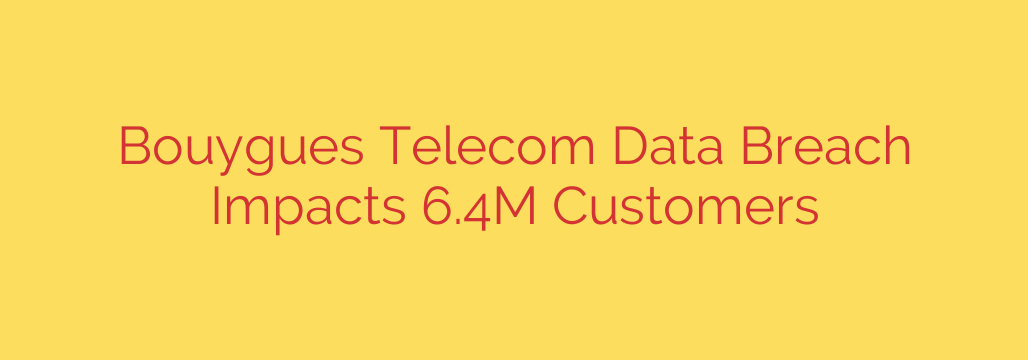
Bouygues Telecom Data Breach: A Guide for 6.4 Million Affected Customers
A significant security incident has impacted French telecommunications giant Bouygues Telecom, exposing the personal information of millions of its customers. The breach, which occurred in early 2024, stems from a vulnerability at a third-party service provider responsible for managing customer contracts.
This event underscores the interconnected nature of digital security, where vulnerabilities in a partner’s system can have far-reaching consequences. Here’s a breakdown of what happened, what data was compromised, and the critical steps you should take to protect yourself.
What Happened in the Bouygues Data Breach?
The security lapse was not within Bouygues Telecom’s core systems but originated from one of its third-party contractors. This provider, tasked with commercial activities like contract management, suffered a breach that allowed unauthorized actors to access a customer database.
The incident specifically affected a large segment of the company’s B&You brand customers. In total, the personal data of approximately 6.4 million customers was exposed. Bouygues Telecom has since secured the vulnerability and is in the process of notifying all individuals impacted by the event.
What Specific Information Was Exposed?
Understanding the exact type of data that was compromised is crucial for assessing your personal risk. According to official reports, the leaked information includes:
- Full Names
- Email Addresses
- Phone Numbers
- Dates of Birth
It is extremely important to note what was not compromised in this incident. Bouygues Telecom has confirmed that no passwords, postal addresses, or banking details were exposed. While the breach is serious, the absence of this highly sensitive financial and credential data limits the immediate threat of direct account takeovers or financial fraud.
The Primary Risk: Phishing and Impersonation Scams
While your bank account may be safe, the combination of your name, email, phone number, and date of birth is a powerful toolkit for cybercriminals. The most significant and immediate danger following this breach is a sharp increase in sophisticated scams.
Be on high alert for:
- Phishing Attacks: Scammers may send emails pretending to be from Bouygues Telecom, your bank, or another trusted service. These emails will use your personal information to appear legitimate and may ask you to click a malicious link or provide your password.
- Smishing (SMS Phishing): You may receive text messages with urgent warnings or fake offers, attempting to trick you into revealing sensitive information or installing malware on your phone.
- Vishing (Voice Phishing): Criminals might call you, using your name and date of birth to build credibility. They may claim there is a problem with your account and ask for financial details or login credentials to “fix” it.
Actionable Security Steps to Take Right Now
If you are a Bouygues Telecom or B&You customer, it is vital to be proactive. Even if you haven’t received a notification, practicing good digital hygiene is your best defense.
Be Extremely Vigilant with All Communications: Treat any unsolicited email, text, or phone call with suspicion. Scammers will leverage the news of this breach to make their attempts more convincing. Legitimate companies will never ask for your password or full financial details over email or SMS.
Verify Before You Click: Do not click on links or download attachments from unexpected emails. If you receive a message claiming to be from Bouygues Telecom, go directly to their official website by typing the address into your browser or using their official app to check your account status.
Strengthen Your Password: Although passwords were not leaked in this breach, it is an excellent opportunity to reinforce your account security. Change your Bouygues Telecom account password to a new, unique, and complex one. Avoid reusing passwords across different websites.
Enable Two-Factor Authentication (2FA): 2FA is one of the most effective ways to secure your online accounts. It requires a second form of verification (like a code sent to your phone) in addition to your password. Enable 2FA on your Bouygues account and all other important accounts, including email and banking.
Inform and Educate Your Family: Make sure your family members, especially those who may be less tech-savvy, are aware of these risks and know how to spot a potential scam.
While data breaches are increasingly common, your response determines your risk. By staying informed and taking these preventative measures, you can significantly reduce the chances of becoming a victim of fraud.
Source: https://securityaffairs.com/180958/data-breach/french-firm-bouygues-telecom-suffered-a-data-breach-impacting-6-4m-customers.html








